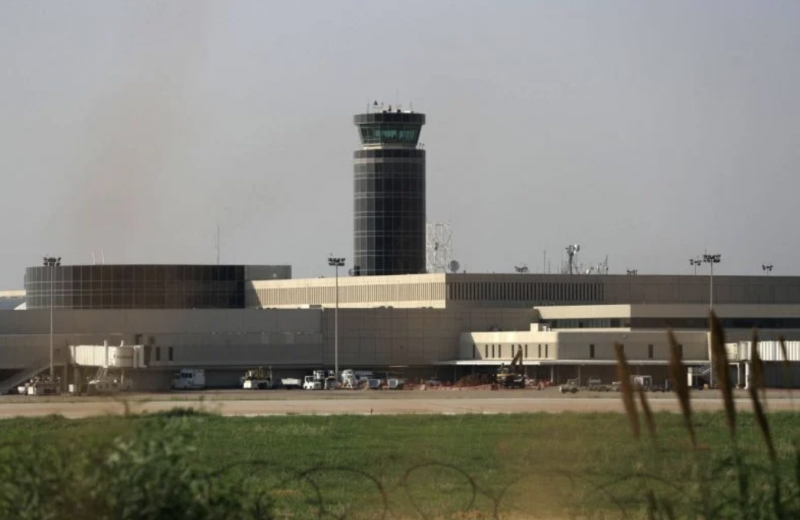
View of the Rafic Hariri International Airport in Beirut, Nov. 1, 2023. (Credit: Ahmad al-Rubaye/AFP)
The Israel-Hezbollah confrontation, which turned from military clashes to a multifaceted security war, has been ongoing at an uneven pace. The intensity of Hezbollah’s attacks on Israeli bases depends on Israel targeting homes, arms warehouses and missile launch pads in south Lebanon. However, Israeli security operations are unabated and take several forms.
They include surveilling Hezbollah, Hamas fighters and officials across Lebanon and identifying key sites linked to the party’s military technologies: Precision missiles, drones and their operating systems.
Parallel to this ongoing technological war, the intelligence war continues. In this vein, a spy cell was identified in Sour, in the Palestinian refugee camp Burj al-Shemali. Three people, including two teenagers, were arrested last week on suspicions of tracking down Hamas leaders in the camp to enable Israel to eliminate them.
This has prompted Hezbollah, Hamas and Lebanese security services to carry out thorough investigations in the south, the Bekaa Valley and the Palestinian refugee camps to identify and arrest the collaborators and to face this war that is based largely on the human element. According to the information available, there have been several arrests that have not yet been made public.
Beirut International Airport
Technology — specifically the continuous jamming of GPS systems in Lebanon — remains the most dangerous weapon. In the south of the country, all applications that use this system are either disabled or give incorrect coordinates.
In recent days, the jamming of navigation systems at Beirut International Airport has been especially noticeable, which prompted Lebanon to officially accuse Israel of violating international law by posing a threat to the airport’s operation and the safety of civil aviation.
In this vein, Beirut is seeking a Security Council resolution condemning Tel Aviv’s actions. According to information obtained by L’Orient-Le Jour, the jamming caused several flights to delay landing in Beirut. These aircraft were forced to head either to Larnaca International Airport in Cyprus or to Turkey, pending a traditional protocol that does not depend on the GPS.
It is still unclear whether Israel is intentionally causing this jamming to put pressure on Lebanon. A few months ago, BIA’s IT systems were hacked, causing it to stop for hours.
There could be other reasons as well, including an ongoing Israeli attempt to locate Hezbollah’s drone and precision-guided missile storage sites. To achieve this end, Tel Aviv is trying to disrupt the operating systems of these missiles and drones, which is affecting the airport’s operation.
New equations
At the military level, Israel is seeking to impose new rules of engagement. Hezbollah had previously established equations, including the “blood for blood” and “city for city,” as well as some proportionality in the long-range strikes and retaliations across the border. However, there is every indication that the Israelis have been working for some time to change these rules.
For instance, they answered a Hezbollah attack targeting the Israeli-occupied Syrian Golan by striking areas around Baalbeck and Saida: Two large cities located several dozen kilometers away from the Blue Line.
Similarly, in response to Hezbollah’s use of drones in its operations, the Israelis are striking what they consider drone storage or launch sites, as they announced recently following the strike on Baalbeck.
Another new element is Israel’s targeting of Hezbollah’s arms supply routes, by striking around Damascus, Qalamoun and Homs, especially Quseir where Hezbollah is well established.
The military confrontation continues, sometimes escalating, sometimes calming down, depending on the progress of negotiations on a ceasefire or a humanitarian truce in Gaza. Over the past few days, amid a failure of the talks, clashes have once again intensified in south Lebanon.
In the wake of the UN Security Council resolution demanding an immediate cease-fire in the Palestinian enclave on Monday, Israeli Defense Minister Yoav Gallant was quick to make it clear from Washington that a halt to hostilities in Gaza would bring closer the prospect of war with Hezbollah on Israel’s northern front.
This statement has multiple implications. It pointed to the Netanyahu cabinet’s need to maintain the state of war, and it constituted a form of blackmail on the Americans, who didn’t veto the resolution. It also intended to impose the equation that if the US steps up pressure for a cease-fire in Gaza and for the Rafah battle not to take place, Israel will expand the war against Hezbollah in return.
Systematic destruction
In short, Israel will not agree to a partial victory in Gaza in exchange for a defeat in Lebanon. To achieve this, it is working on several fronts, both military and diplomatic. In the negotiations, it is setting clear conditions linked to the withdrawal of Hezbollah and its heavy weapons under the terms of an agreement. On the ground, it is focusing its strikes on the border localities, causing them major destruction.
Several reasons may be involved here. Firstly, the Israelis are trying to make it impossible to live in these areas to claim that they succeeded in keeping Hezbollah five kilometers away. This systematic destruction, in particular of villages including Kfar Kila and Aita al-Shaab, could also be a prelude to a potential ground invasion of a five-kilometer distance at a later stage.
During the July 2006 war and at the start of the ground advance, the Israelis took Aita al-Shaab first, but Hezbollah ambushed them several times. Hence, Hezbollah, which thwarted three infiltration attempts since Oct. 8, 2023, is particularly vigilant in this respect.
This article was originally published in L'Orient-Le Jour. Translated by Joelle El Khoury.